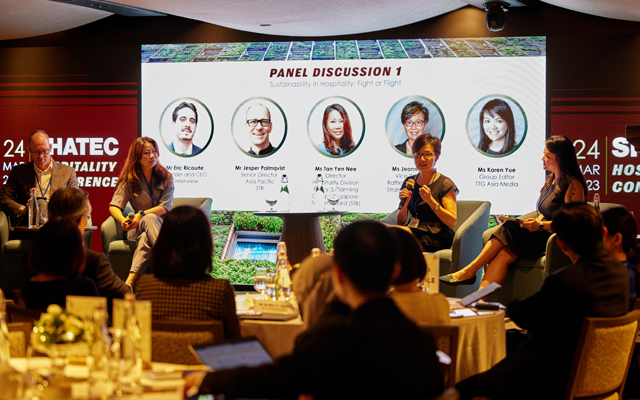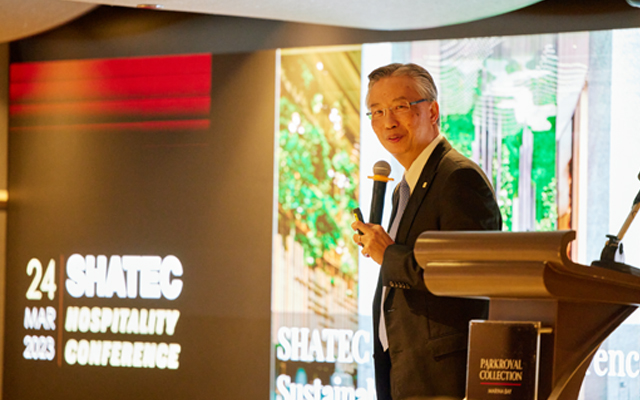- Sustainability strategy brings clear commercial benefits
- Green efforts are a pricey but necessary long-term commitment
- Technology improvements in food waste management can help hotels reach circular economy goals
SHATEC – The International Hotel & Tourism School (Singapore) placed environmental sustainability at the core of its one-day Hospitality Conference 2023 on Friday, with industry leaders and subject matter experts brought in to discuss achievements, challenges and learning points in sustainability management.
Speakers at the two keynote panels, moderated by TTG Asia Media’s group editor, Karen Yue, were unanimous about the commercial benefits of pursuing a sustainability strategy, stating that the payback goes beyond a positive reputation.

Jesper Palmqvist, senior director Asia Pacific, STR, pointed to higher chances of attracting funding from financial institutions that prioritise green projects, long-term efficiencies leading to better operating profits, stronger appeal among a generation of talents who reserve their loyalty for responsible employers, and more.
“We all know that this (being environmentally responsible) is the right thing to do, but let’s not be naïve – the world is still capitalist and businesses are out to make money,” he remarked.
Citing a business case for being environmentally sustainable, Choe Peng Sum, CEO of Pan Pacific Hotels Group, said securing the Green Mark Platinum certification from the Singapore Building and Construction Authority for his company’s soon-to-launch Pan Pacific Orchard resulted in a S$120 million (US$90 million) green loan, up to three per cent additional gross floor area – which he said could mean an extra floor of guestrooms, and cash incentive to lower upfront cost of energy efficiency retrofits.
John Timson, vice president sustainability and safety – South East Asia, Japan and Korea, Accor, believes that green hotels are going to be the norm, as travellers are now highly conscious of their actions impacting the environment, so much so that brown hotels – those lacking in environmental consciousness – will be forced to do drop rates to attract customers, ultimately denting their revenues.
“Guests will no longer notice the absence of plastic bottles on the table. Rather, they will notice that the hotel is (excessively cold), or the guestroom lights up like a football stadium and they cannot switch off all the lights. They will remember (these disappointments),” he said.
A costly commitment
However, sustaining a sustainability strategy has its challenges.
“There is so much value that sustainability can create, but it will also require many things that would cost more,” stated Eric Ricaurte founder and CEO of Greenview, a specialised provider of sustainability programmes for the hospitality and tourism industry, adding that it is therefore important for the chief financial officer to also be fully behind the company’s sustainability strategy.
Choe agrees that being sustainable is a pricey commitment.
Citing examples in his presentation, Choe said the construction of Parkroyal Collection Pickering, which features 1,393.5m2 of foliage covering over 200 per cent of hotel land area, took S$140 million to construct; the asset enhancement of the building taken over by Parkroyal Collection Marina Bay cost S$45 million, with new features being the adoption of more than 2,400 indoor plants and shrubs throughout the interior.
Without these biophilic features, construction costs would have been halved, he noted.
“But these are more than just aesthetics. All that greenery gives these properties a different quality of air and cools the air naturally. Reducing just two degree Celcius without the use of air-conditioning mean substantial energy savings,” he said.
Jeanette Ho, vice president, Raffles global brand strategy & strategic partnerships, Accor, remarked that sustainability efforts “cannot be seen as a cost element”, as they are part of a responsible business model.
For such a mindset change, leadership is required. She said Accor’s sustainability strategy is supported by its chief sustainability officer, chief executive officer and chief financial officer.
“Our leadership is behind it, and they drive excitement throughout the company (about our action plans) and filter objectives through to our front liners, business partners and guests,” she said.

Hesitant first steps
Beyond cost concerns, Ricaurte also recognises that business owners and leaders are held back from the “unknown” surrounding sustainability.
“I’d like to cite (Albert) Einstein here: ‘As our circle of knowledge expands, so does the circumference of darkness surrounding it’. As you (embark on sustainability), you will begin to realise there are a lot of other things you need to learn and do. That’s why people hesitate,” Ricaurte explained.
Ho added that difficulties also stem from having to get multiple properties and staff aligned with all the sustainability standards and key actions in the company’s sustainability strategy.
Accor’s Planet21 programme, which spans 10 years, covers about 150 different standards. It is executed across more than 5,000 hotels worldwide and involves half a million colleagues.
According to Chen Wenjie, associate director of Building System & Diagnostics, a consultancy agency that advises on environmentally sustainable design and construction of buildings and the built environment, the best efforts are made right from the start, when a hotel building is being designed, as everything from materials used and building layout can impact the eventual green processes the hotel owner and/or operator hopes to implement in the course of business.
“Retrofitting a building for sustainability will be an even more costly and time-consuming effort,” Chen added.
However, as 80 per cent of Singapore hotels were built before sustainability and the circular economy concept became mainstream considerations, Choe said hotel owners have to invest in hardware improvements to support green goals.
Choe found convincing owners to put down millions on refurbishments tended to be easier when the outcomes were visible and would directly benefit guests, such as upgraded guestrooms and ballrooms.
“If you tell the owner that you need S$40 million to retrofit the hotel and half of the money is going into areas where guests cannot see, such as new piping, new wiring, new-gen inverter cooling systems, it is tough. These improvements are all behind the scene, but so necessary to improve energy consumption and waste,” he added.
In Singapore, hoteliers can get help from the Singapore Tourism Board (STB) in taking their first sustainability steps.
STB and the Singapore Hotel Association launched the Singapore Hotel Sustainability Roadmap in 2022 to guide lodging and accommodation businesses in the country down the green track. And to encourage industry’s participation, the NTO created the Tourism Sustainability Programme, which offers grants that hotels can utilise to trial “innovative solutions for sustainability and technology that can help them be more efficient in resource development”, detailed Tan Yen Nee director, STB’s Hospitality Division Policy & Planning Group.
“Another important function of the Tourism Sustainability Programme is its support for workforce capability development. Grants are available to support hotels in their effort to build the skillsets necessary for new and emerging sustainability roles,” said Tan.
Tan shared that industry involvement is strong, and STB will continue to help local hotels attain internationally-recognised certifications like those issued by the Global Sustainable Tourism Council.
“It is also important to close the sustainability loop by educating our visitors on sustainable practices, and that is something STB is doing too,” she added.

Technology for circular economy
Accor’s Ho said the company’s sustainability approach has long moved from “compensation to contribution”, where efforts are focused on innovative ways to be carbon negative instead of just offsetting carbon.
“Our focus is very much on the circular economy,” she added.
One of the ways for hotels to maximise the lifecycle of its resources is through food waste management, suggested Jason Hoen, global sales & marketing director, Green Eco Technologies.
“Food waste contains as much energy and nutrients as food that is eaten. But most of that gets destroyed or put into landfills. The first-generation waste management systems also use a lot of valuable energy to cook the moisture out of food waste,” said Hoen.
Addressing the limitations of the old system, Green Eco Technologies’ star product, the WasteMaster, converts all food stuff as well as cutlery and packaging made of natural materials like bamboo and paper, into a versatile, nutrient-rich residual product.
“The uses of this residual product can vary. In Australia, we use it for green energy. In Singapore, we use some for green energy and turn the rest into fish food. In Dubai, it is used to improve the quality of its soil for agricultural purposes,” shared Hoen.




















